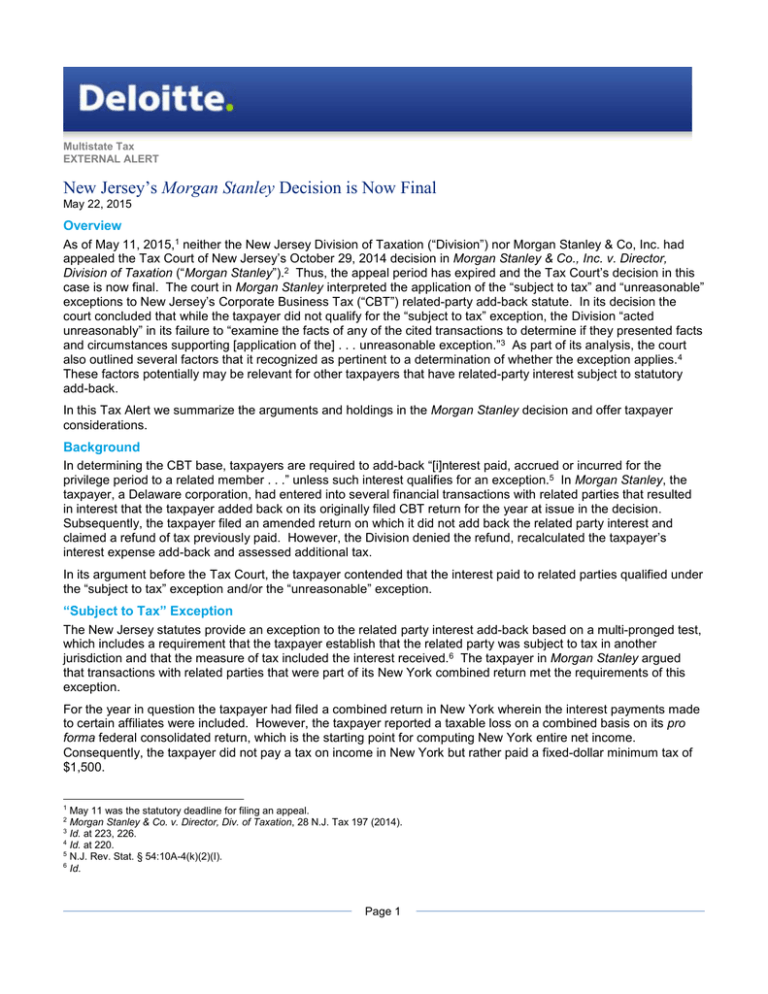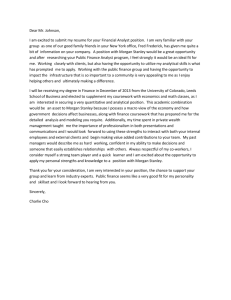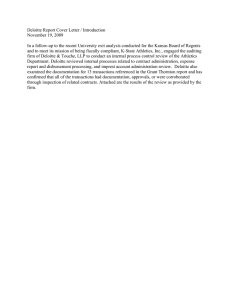
Multistate Tax
EXTERNAL ALERT
New Jersey’s Morgan Stanley Decision is Now Final
May 22, 2015
Overview
As of May 11, 2015,1 neither the New Jersey Division of Taxation (“Division”) nor Morgan Stanley & Co, Inc. had
appealed the Tax Court of New Jersey’s October 29, 2014 decision in Morgan Stanley & Co., Inc. v. Director,
Division of Taxation (“Morgan Stanley”).2 Thus, the appeal period has expired and the Tax Court’s decision in this
case is now final. The court in Morgan Stanley interpreted the application of the “subject to tax” and “unreasonable”
exceptions to New Jersey’s Corporate Business Tax (“CBT”) related-party add-back statute. In its decision the
court concluded that while the taxpayer did not qualify for the “subject to tax” exception, the Division “acted
unreasonably” in its failure to “examine the facts of any of the cited transactions to determine if they presented facts
and circumstances supporting [application of the] . . . unreasonable exception.”3 As part of its analysis, the court
also outlined several factors that it recognized as pertinent to a determination of whether the exception applies. 4
These factors potentially may be relevant for other taxpayers that have related-party interest subject to statutory
add-back.
In this Tax Alert we summarize the arguments and holdings in the Morgan Stanley decision and offer taxpayer
considerations.
Background
In determining the CBT base, taxpayers are required to add-back “[i]nterest paid, accrued or incurred for the
privilege period to a related member . . .” unless such interest qualifies for an exception.5 In Morgan Stanley, the
taxpayer, a Delaware corporation, had entered into several financial transactions with related parties that resulted
in interest that the taxpayer added back on its originally filed CBT return for the year at issue in the decision.
Subsequently, the taxpayer filed an amended return on which it did not add back the related party interest and
claimed a refund of tax previously paid. However, the Division denied the refund, recalculated the taxpayer’s
interest expense add-back and assessed additional tax.
In its argument before the Tax Court, the taxpayer contended that the interest paid to related parties qualified under
the “subject to tax” exception and/or the “unreasonable” exception.
“Subject to Tax” Exception
The New Jersey statutes provide an exception to the related party interest add-back based on a multi-pronged test,
which includes a requirement that the taxpayer establish that the related party was subject to tax in another
jurisdiction and that the measure of tax included the interest received.6 The taxpayer in Morgan Stanley argued
that transactions with related parties that were part of its New York combined return met the requirements of this
exception.
For the year in question the taxpayer had filed a combined return in New York wherein the interest payments made
to certain affiliates were included. However, the taxpayer reported a taxable loss on a combined basis on its pro
forma federal consolidated return, which is the starting point for computing New York entire net income.
Consequently, the taxpayer did not pay a tax on income in New York but rather paid a fixed-dollar minimum tax of
$1,500.
1
May 11 was the statutory deadline for filing an appeal.
Morgan Stanley & Co. v. Director, Div. of Taxation, 28 N.J. Tax 197 (2014).
3
Id. at 223, 226.
4
Id. at 220.
5
N.J. Rev. Stat. § 54:10A-4(k)(2)(I).
6
Id.
2
Page 1
Based on the foregoing, the Tax Court concluded that since it was clear that the taxpayer had not paid the tax on its
measure of income that included the interest received, but rather a fixed-dollar minimum tax, the taxpayer did not
qualify for exception under the “subject to tax” rule.7 Furthermore, the taxpayer did not provide any evidence other
than its New York return to support qualification for this exception. 8
“Unreasonable” Exception
Related party interest add-back is not required “if the taxpayer establishes by clear and convincing evidence, as
determined by the Director, that the disallowance of a deduction is unreasonable . . . .” 9 After reviewing the
legislative history of the add-back statute and the statutory language, the Tax Court rejected the taxpayer’s position
that all that is necessary for this “unreasonable” exception to apply is a valid non-tax purpose and economic
substance.10 The court explained that “something more . . . must be demonstrated to qualify for the unreasonable
exception . . .” and then the court provided a list of factors that it deemed relevant to such an analysis: “unfair
duplicative taxation; a technical failure to qualify the transaction under the statutory exceptions; an inability or
impediment to meet the requirements due to financial constraints; an unconstitutional result; a demonstration that
the transaction for all intents and purposes is an unrelated loan transaction.”11
The court next assessed whether the Division had adequately considered the taxpayer’s facts. As part of this
analysis, the court reviewed its unpublished decision in Beneficial New Jersey v. Division of Taxation,12 noting that
determining the applicability of the unreasonable exception involves a “case-by-case” examination of the “totality of
the circumstances” and is “heavily dependent on the facts of each such case.”13 The court in Morgan Stanley
explained further that this case-by-case factual analysis is “echoed” by the Division’s Technical Advise
Memorandum TAM-2011-13, which sets forth several examples where the applicability of the unreasonable
exception will be recognized.14
The court ultimately concluded that in determining whether the unreasonable exception applied, the Division, by its
failure to examine the totality of facts and circumstances, had not applied the required factual analysis. As
explained by the court, although the Division acknowledges that the application of the unreasonable exception is
“fact sensitive,” it is clear that the Division “failed to examine the facts of any of the cited transactions to determine if
they presented facts and circumstances supporting an unreasonable exception.”15 Once the Division “determined
that the facts did not support a conclusion that a tax was paid on the interest income, the examination ended.”16 By
limiting the inquiry to the question of whether tax was paid in another jurisdiction, the Division “abused [its]
discretion by failing to take into account even [its] regulations and informational statement of the law, which clearly
demonstrate that the sole criteria is not the payment of tax.”17
Based on the foregoing, the court ruled in favor of the taxpayer, concluding that the Division “evaluated the
[taxpayer’s] transactions under criteria that is contrary to the statute, regulations and published guidance” and,
accordingly, acted “unreasonably” when it reviewed the taxpayer’s “add-back transactions under the unreasonable
exception.”18
Considerations
As the appeal period has expired, the decision in Morgan Stanley is final. Taxpayers who are under audit or have
added back interest expense on their returns may wish to consider whether they may potentially benefit by
asserting the “unreasonable” exception under the principles determined in Morgan Stanley. Taxpayers may wish to
consider a “totality of the circumstances” factual analysis based upon, as applicable, the broad indicators outlined
by the court, namely, unfair duplicative taxation, a technical failure to qualify the transaction under the statutory
7
Morgan Stanley, 28 N.J. Tax at 215.
Id. at 214.
9
N.J. Rev. Stat. § 54:10A-4(k)(2)(I).
10
Morgan Stanley, 28 N.J. Tax at 220-221.
11
Id. at 220.
12
Beneficial New Jersey v. Div. of Taxation, No. 009886-2007 (N.J. Tax Ct. 2010).
13
Morgan Stanley, 28 N.J. Tax at 221, citing Beneficial New Jersey v. Div. of Taxation, No. 009886-2007 (N.J. Tax Ct. 2010).
14
Morgan Stanley, 28 N.J. Tax at 221-222.
15
Id. at 223.
16
Id.
17
Id. at 225.
18
Id. at 226. In rendering its decision, the court granted the taxpayer’s Motion for Summary Judgment and denied the Division’s Cross-Motion
for Summary Judgment.
8
Page 2
exceptions, an inability or impediment to meet the requirements due to financial constraints, an unconstitutional
result or a demonstration that the transaction for all intents and purposes is an unrelated loan transaction.
Contacts
If you have questions regarding Morgan Stanley, or pertaining to other New Jersey tax matters, please contact any
of the following Deloitte Tax LLP professionals.
Norman Lobins
Director
Deloitte Tax LLP, Parsippany
nlobins@deloitte.com
(973) 602-5373
Michael Bryan
Director
Deloitte Tax, LLP, Philadelphia
mibryan@deloitte.com
(215)977-7564
Jayesh Desai
Senior Manager
Deloitte Tax LLP, Parsippany
jaydesai@deloitte.com
(973) 602-6989
This alert contains general information only and Deloitte is not, by means of this alert, rendering accounting, business,
financial, investment, legal, tax, or other professional advice or services. This alert is not a substitute for such
professional advice or services, nor should it be used as a basis for any decision or action that may affect your
business. Before making any decision or taking any action that may affect your business, you should consult a
qualified professional advisor. Deloitte shall not be responsible for any loss sustained by any person who relies on this
alert.
About Deloitte
Deloitte refers to one or more of Deloitte Touche Tohmatsu Limited, a UK private company limited by guarantee (“DTTL”), its network of
member firms, and their related entities. DTTL and each of which is a legally separate and independent entity. DTTL (also referred to as
“Deloitte Global”) does not provide services to clients. Please see www.deloitte.com/about for a detailed description of DTTL and its
member firms. Please see www.deloitte.com/us/about for a detailed description of the legal structure of Deloitte LLP and its
subsidiaries. Certain services may not be available to attest clients under the rules and regulations of public accounting.
Copyright © 2015 Deloitte Development LLC. All rights reserved.
Member of Deloitte Touche Tohmatsu Limited
Page 3





